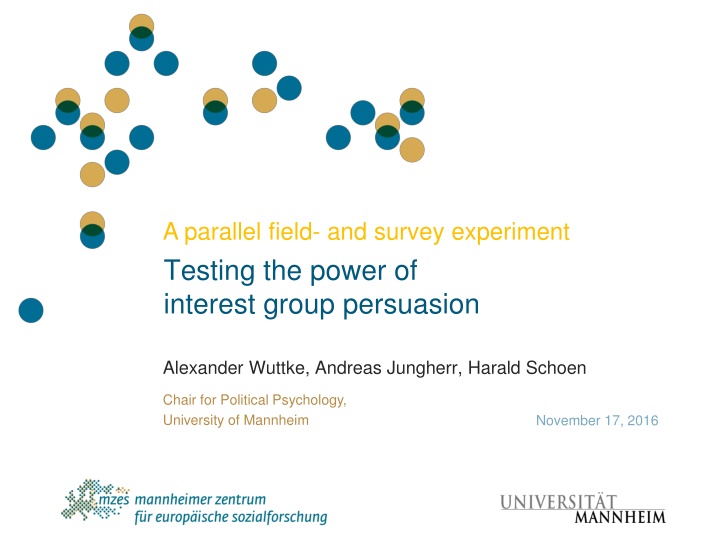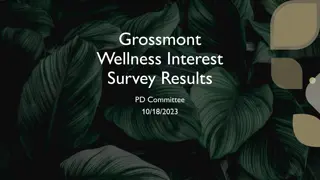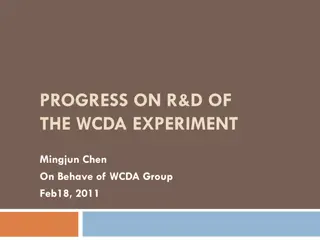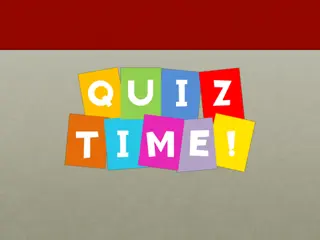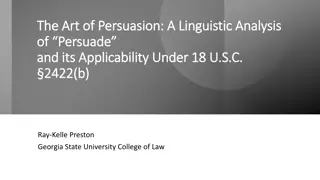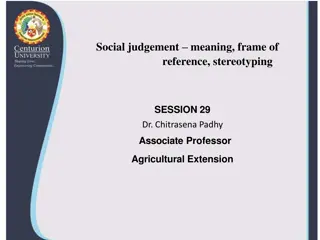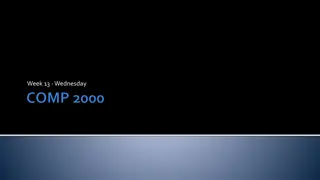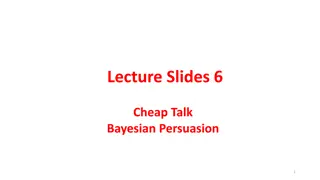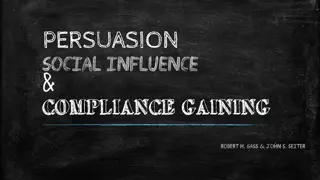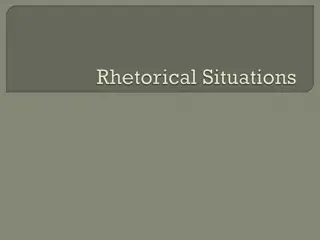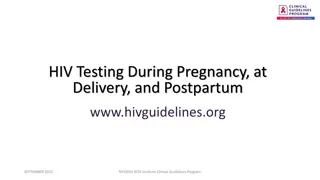Testing the Power of Interest Group Persuasion: A Field and Survey Experiment
Examining the impact of interest group persuasion through a parallel field and survey experiment conducted by Alexander Wuttke, Andreas Jungherr, and Harald Schoen at the University of Mannheim. The study focuses on comparing persuasive tactics of interest groups, utilizing artificial environments, and avoiding self-selection bias to address the replication crisis. Design, methodology, findings, and measures related to the study are analyzed.
Download Presentation

Please find below an Image/Link to download the presentation.
The content on the website is provided AS IS for your information and personal use only. It may not be sold, licensed, or shared on other websites without obtaining consent from the author.If you encounter any issues during the download, it is possible that the publisher has removed the file from their server.
You are allowed to download the files provided on this website for personal or commercial use, subject to the condition that they are used lawfully. All files are the property of their respective owners.
The content on the website is provided AS IS for your information and personal use only. It may not be sold, licensed, or shared on other websites without obtaining consent from the author.
E N D
Presentation Transcript
A parallel field- and survey experiment Testing the power of interest group persuasion Alexander Wuttke, Andreas Jungherr, Harald Schoen Chair for Political Psychology, University of Mannheim November 17, 2016
Persuasion by interest groups Interest Groups (Gilens/Page 2014, Graetz/Shapiro 2006) Persuasion (Ajzen 2012, O Keefe 2015, Bri ol/Petty 2009, Feld) Interest Group Persuasion in the Field (Broockman/Kalla 2016)
Design Wave 1 Wave 2 Wave 3 April 28th May 11th June 20th June 22th June 04th June 13th May 30th Consent & Address Pre-Test Effect Decay Post- Treatment N = 8,631 N=4,819 N = 3,700
Design Online Access Panel Sample
Design Wave 1 Wave 2 Wave 3 April 28th May 11th June 20th June 22th June 04th June 13th May 30th Consent & Address Pre-Test Effect Decay Post- Treatment N = 8,631 N=4,819 N = 3,700
Testing persuasion in the field Artificial environment Coerced attention and compliance No self-selection Replication crisis Parallel experiments (Leeper/Mullinix 2015) Comparison of survey- and field-experiments (Mitchell 2012a/b, Coppock/Green 2015)
Design 2: Methodological Interest Online Access Panel Sample Wording- Experiment One- Sided Two- Sided Mode Online Offline Online Offline
Measures Intro: Deutschlands mit den USA ber ein Transatlantisches Freihandelsabkommen. Die Verhandlungen ber Transatlantische Freihandelsabkommen [sic!], genannt TTIP, sollen in diesem Jahr abgeschlossen werden. In der ffentlichkeit werden gegenw rtig die Vor- und Nachteile von TTIP diskutiert. Hier sehen Sie einige Aussagen zum Freihandelsabkommen TTIP. Bitte geben Sie an, wie sehr Sie folgenden Aussagen zustimmen. Momentan verhandelt die Europ ische Union auch im Namen QT: die EU das Freihandelsabkommen TTIP mit den USA unterzeichnet. Die deutsche Bundesregierung sollte sich daf r einsetzen, dass QT: Deutschland mehr Vor- als Nachteile bringen. Alles in allem wird das Freihandelsabkommen TTIP QT: abgebrochen werden. (reverse coded) Die Verhandlungen ber das Freihandelsabkommen sollten (1) stimme berhaupt nicht zu; (2); (3); (4) teils/teils; (5); (6); (7) stimme voll und ganz zu. 10. Oktober 2024
Measures Intro: negotiates the Transatlantic Trade and Investment Partnership with the U.S. The negotiations on Transatlantic Trade Agreement [sic!], called TTIP, are expected to be finalized by the end of this year. Currently, advantages and disadvantages of TTIP are discussed in the public debate. In the following, there are several statements on the free trade agreement TTIP. Please indicate to what extent you agree with each of the statements. At the moment, the European Union, also on behalf of Germany, QT: free trade agreement TTIP between the EU and the U.S. The German government should advocate the ratification of the QT: associated with the free trade agreement TTIP for Germany. In general, there are more advantages than disadvantages QT: terminated. (reverse coded) The negotiations on the free trade agreement should be (1) strongly disagree; (2), (3); (4) partly/partly; (5); (6); (7) strongly agree. 10. Oktober 2024
Main treatment effects on TTIP-attitudes 10. Oktober 2024
Trichotomization Support Neither / nor Oppose % 4% 8% 12% 16% 20% 10. Oktober 2024
TTIP: ATTITUDES IN W1 (N=8,631) Survey Field Control Support TTIP Neither / nor Oppose TTIP 0 5 10 15 20 25 30 35 40 45 50 10. Oktober 2024
TTIP: ATTITUDES IN W2 (N=6,171) Survey Field Control Support TTIP Neither / nor Oppose TTIP 0 10 20 30 40 50 60 10. Oktober 2024
Differences betwen Control and Treatment Groups (Wave 2) Postal - Control Survey - Control Support Neither Nor Oppose -20 -12 -4 4 12 20 10. Oktober 2024
TTIP: ATTITUDES IN W3 (N=4,659) Survey Field Control Support TTIP Neither / nor Oppose TTIP 0 5 10 15 20 25 30 35 40 45 50 10. Oktober 2024
Agreement: Object-specific considerations Controls Postal Survey Benefits Industry Harms Consumers Impairs Democracy Strengthens Influence 0 0.1 0.2 0.3 0.4 0.5 0.6 0.7 0.8 0.9 1 10. Oktober 2024
Knowledge: Familiarity with arguments Control Postal Survey New Jobs More Exports Western Standards Consumer Protection Environmental Standards 0 0.1 0.2 0.3 0.4 0.5 0.6 0.7 0.8 0.9 1 10. Oktober 2024
Reading the letter ATTITUDE TOWARDS TTIP Unterst tze TTIP Weder Noch Lehne TTIP ab 0 25 50 75 100 UNION MEMBERSHIP Ja Nein 0 25 50 75 100
What next? Causes of Mode-Differences Open-end responses Psychological mechanisms 10. Oktober 2024
Conclusio A simple letter changes attitudes No effects of wording Effect decay Substantial differences by mode No evidence for substantial effect heterogeneity 10. Oktober 2024
Thank you 10. Oktober 2024
Raw Values Unterst tze TTIP: 1 Weder noch: 0,5 Lehne TTIP ab: 0 % 4% 8% 12% 16% 20% 10. Oktober 2024
Interplay of Survey-Mode, Eleboration and Attention on Attitude Change Attitude Certainty Attitude Importance Low High Exposure: Select. Exp.: Attitude Change: High Mot. Reasoning: Low Low Low Exposure: Select. Exp.: Attitude Change: Low Mot. Reasoning: Low Low Middle Low Exposure: Select. Exp.: AttitudeChange: Middle/ High Middle Exposure: Select. Exp.: Attitude Change: Low Middle High High High Mot. Reasoning: Middle Mot. Reasoning: High
Motivated Reasoning 10. Oktober 2024
